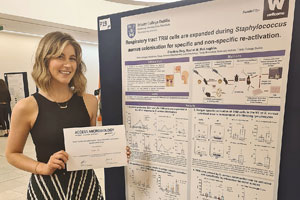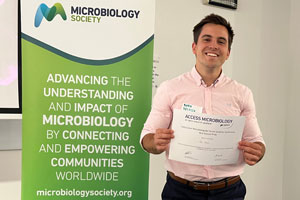ECM Forum Summer Conference 2022: Access Microbiology poster prize winners
Posted on September 13, 2022 by Microbiology Society
The 2022 Early Career Microbiologists (ECM) Forum Summer Conference took place in July, returning to its in person annual meeting format in Sheffield following a two-year hiatus due to the global health crisis. At the meeting, we awarded two poster prizes, sponsored by our open research platform Access Microbiology.
As a sound science, open research platform, Access Microbiology offers a new service for members of our community to disseminate their work rapidly, transparently and rigorously. In this blog, we find out more about the winners, Cliodhna Daly and Pablo Relucio Bajo.

Cliodhna Daly: “Respiratory tract TRM cells are expanded during Staphylococcus aureus colonisation for specific and non-specific re-activation.”
Who or what inspired you to be a scientist?
My secondary school biology teacher.
What are you currently working on and what area of your research excites you the most?
I am currently investigating issue-resident memory (TRM) cells in the respiratory tract, of Staphylococcus aureus mono-colonised mice. I have the unique opportunity to work with germ-free animals and to develop an animal model of persistent S. aureus colonisation, which I am very excited about.
How would you explain your poster to a child under 10?
Bacteria like Staph can live in our noses without making us sick. I want to know the effects this non-infecting Staph can have on the cells that make up our immune system, which usually fight off bugs to keep our body healthy. TRM cells are one type of immune cell which stays in the nose. I found that having Staph in the nasal tissue of mice caused these TRM cells to be better at fighting away infection with other bugs, which would mean that having Staph in our noses could help protect us from other illnesses.
What would you be doing in your career if you weren’t a scientist?
If I were talented enough, a Broadway actress, otherwise maybe a nutritionist.

Pablo Relucio Bajo: “Optimising a method for investigating the bRSV immunopeptidome by mass spectrometry”
Who or what inspired you to be a scientist?
I’ve always been fascinated by the natural world. Biology, physics, chemistry… it just fascinated me! Therefore, since a very young age I knew I would become a scientist, and I’ve been lucky enough to have very good role models from school through university, which have made that passion for science even greater.
What are you currently working on and what area of your research excites you the most?
For the past year I have been studying the cattle major histocompatibility complex Class I (MHC-I) immunogenetics. I am very interested in genetics and computational biology, areas in which I’d like to develop my career. Nothing concrete yet. As an undergraduate, I am still in the process of learning and discovering my true passion.
How would you explain your poster to a child under 10?
My poster describes how we can identify the little pieces of a virus a cow’s defence system would recognise. That way we can help make effective vaccines using those bits of virus, which teach the cow’s defence system what it should be on the lookout for and prepare it for the attack of real viruses!
What would you be doing in your career if you weren’t a scientist?
I’d probably be an engineer! As a kid I hesitated between becoming a scientist or an F1 pilot. Pilot probably was a bit unrealistic, but maybe mechanical engineer in an F1 team could have been my alternative career!

